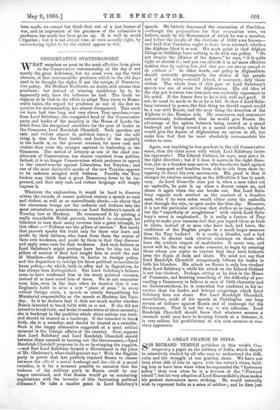TOPICS OF THE DAY.
THE ARBITRATION.
WE cannot assent to the policy of this settlement by arbitration without certain reserves. The Government has so strained—as we begin to think, so unwisely strained—its necessary prerogative of secrecy, that all comment must be impaired by uncertainty as to material facts ; but there certainly seems to be one weak place in the reported arrangements. As the story was originally told in the Daily News, and apparently confirmed by Lord Granville, the proposals for a truce accepted by the two Governments seemed satisfactory enough. The Government of Russia, though declining to allow the conduct of military officers to be made a subject of arbitration, accepted the responsibility of that conduct, and agreed to ask a friendly 'Sovereign, to be named by both parties, to decide whether either of the two Powers had broken the Convention of March 16th. This was, in fact, an admission, previously refused, that Russia might have been in the wrong, and was accompanied by a proviso that until the award had been given and the frontier marked out, both Russians and Afghans should retire from the debated zone. Taken together, these two proposals formed an important concession to the claims of justice ; and most men, we believe, conceived that events had run nearly in this wise. The Asiatic Department of the Russian Foreign Office had tried to obtain certain preliminary advantages in the way of actual possession of disputed positions, and had carried matters against the Afghans, and therefore against the English, with an aggressively high hand. They had seized territory still disputed, or at all events within the region to be mapped out by a friendly Commission ; they had fought merely to obtain prestige, and they had refused to give either explanation or redress. The Czar, moreover, and his advisers, believing that the British Government was only half-hearted, had decided, more or less positively, to support the Asiatic Department. Mr. Gladstone's speech, however, of April 27th, warned all Europe, St. Petersburg included, that England meant war, the Czar reconsidered the full consequences of war to his Empire and his dynasty, and after holding a Council of his great advisers, he decided that war was inexpedient, and that in consequence the English proposal of arbitration should, with some variations, be adopted. In short, he accepted peace, and retraced the steps taken by his Asiatic Department. It is quite possible even now that although certain efforts are made to smooth matters for the Czar, whose position before his own people is understood to be abnormally difficult, this general belief may be substantially accurate ; and if so, we do not see how Liberals can raise any serious objection. They do not want war with Russia at any price. They do not care about Afghan boundaries, provided those boundaries are honestly defined ; and though they begin gravely to doubt whether the world is ready for arbitration, and whether trustworthy arbitrators exist, they are pledged alike by profession and by precedent to accept arbitration when it is not obviously dishonourable. It is, in fact, impossible for them to commence a great war rather than allow a disinterested authority to decide whether the alleged cause for that war exists or not. If they do, they will be disunited ; and if they are disunited, the best chance of success in war at once disappears. Moreover, the Russian retreat from the debateable land would of itself have been proof that Russia ripented of her violence, and would have warned all inhabitants of Central Asia that she was not prepared to advance, in spite of English opposition, out of sheer wilfulness and ambition. The statesmen both of Asia and Europe would have perceived that war with England was considered, even by a Power like Russia, a most serious contingency; and the agents of the two great Empires would have dealt for the future with each other upon terms of recognised equality. The inherent danger of the situation would not have been obviated ; but the increase to that danger caused by the violence and unscrupulousness of Russian counsels would have disappeared.
But then, is this the substance of the arrangement We are willing to hope it is, for we do not desire war with Russia, and do desire with some passion the credit of the Liberal Government ; but we feel grave doubts. Of all the Governments that ever reigned in Great Britain, this one takes the least trouble to seem strong in external affairs ; but it is difficult to think over the brief statement read by Mr. Gladstone and Lord Granville on Monday, and the broad hints given by Mr. Gladstone on Tuesday that the Ameer does not want Penjdeh, and the statement of Lord Granville on the same evening, without a suspicion that while the arbitration is accepted, and covers even more ground than was supposed, the joint retirement of Russians and Afghans will not be insisted on. The Russian Government is only to " consider " that retirement, and may consider it unfavourably, or rather—for this is, we suspect, the truth—may consider it favourably subject to the remonstrances of its Asiatic agents, who are sure to declare that in so wild a region, and amidst tribes so insensible to anything but strength, any withdrawal would be dangerous to Russian authority. We fear that the mutual withdrawal will be silently abandoned ; and if so, the situation will be this. Russia will have consented under honourable forms to apologise for the Pul-i-Khisti incident ; but she will not only keep all the territory that incident gave her, but she will keep, in Asiatic eyes, all the prestige resulting from victory in the field, which prestige is considerable. We here think of the affair of Pul-i-Khisti as a skirmish, or at most, as an "engagement "Mr. Gladstone's word—but Central Asia thinks of it as proof that Afghan soldiers cannot fight Russian soldiers even at odds of three to one. That is a very serious position for Afghans, and a most unjust one. If Russia retires, they will feel safe for the future, for they will understand quite well that Russia would not retire except under English pressure of some kind ; but if she does not retire they will hold that her future advance is limited only 13; her own will—in other words, that legal boundaries are, if Russia is unscrupulous, no protection at all. The whole ultimate object of these negotiations, the fixing of a boundary which cannot be passed, will be foiled beforehand, and we shall always remain in the position we are in now, that Afghanistan is safe only while England is under arms, and while the Czar, therefore, is closely watching his agents. We do not like that position, and wish we could be sure that the Government would be firm on this point, even if war again seemed probable or certain. It is all nonsense to talk of the valuelessness of the territory in dispute. That is not the question at issue. Grant that it is as valueless as a Paraguayan Bondotill when two suitors have agreed to submit their claims to those bonds to experts, the one who snatches the papers by force, and refuses to return them, requires to be restrained.
We shall be told that we are advising a war for the sake of prestige, and that this is Jingoism plain and simple ; but the accusation is unfounded. We want a peace which will last, and we believe that the first condition of that peace is that Russian agents shall be aware that they must treat England as they would treat Germany or Austria ; that their claims, if they have claims, must be settled by diplomacy ; and that a resort to violence is absolutely out of the question. Just imagine a Russian General claiming a dubious post on the Galician frontier, shooting down the Austrian garrison which held it, and then while his Government apologised, retaining possession of the Austrian barracks till the frontier had been resurveyed! Such an incident would be impossible ; it ought to be equally impossible in Asia ; and it never will be impossible till Russian agents understand that a forcible advance means for them, even when they are in the right, nothing but a retreat until diplomady has decided. That conviction seems to us the very object of making a frontier line which, without it, will be to us, and still more to Afghans, no gain at all. We cannot but think that this occasion was one for impressing this idea, and that in foregoing it, if it has been foregone, we shall have done much to weaken the value of all our other efforts towards securing permanent peace. No frontier can be safe unless the officials on either side are afraid of impairing or threatening the rights of those on the other, and when they lose nothing by aggression, not even an order to retire pending negotiations, they will not be afraid. We want the frontier between Russia and Afghanistan, in fact, to be like a European frontier, and not like the frontier between the United States and Mexico; and in not insisting upon the evacuation of the territory to be defined, we shall, we fear, fail to obtain that ultimate object. Even if Russia is warned by the danger she has run, her agents will be encouraged by their apparent triumph. We are quite willing, where it is possible, to build a bridge for the Czar ; but we doubt the prudence of building it by a concession which we may be sure will seem to every ambitious young General on the frontier an encouragement to aid diplomacy, as he will think, by preliminary violence. If the concession has not been made, of course our objection fails, and we have only been deceived by the reticence of diplomatists ; but if it has
been made; we cannot but think that out of a just horror of war, and an impression of the greatness of the calamities it produces, too much has been given up. It is well to avoid litigation; but it is not always wise, or even morally right, by surrendering rights to let the violent appear to win.



































 Previous page
Previous page